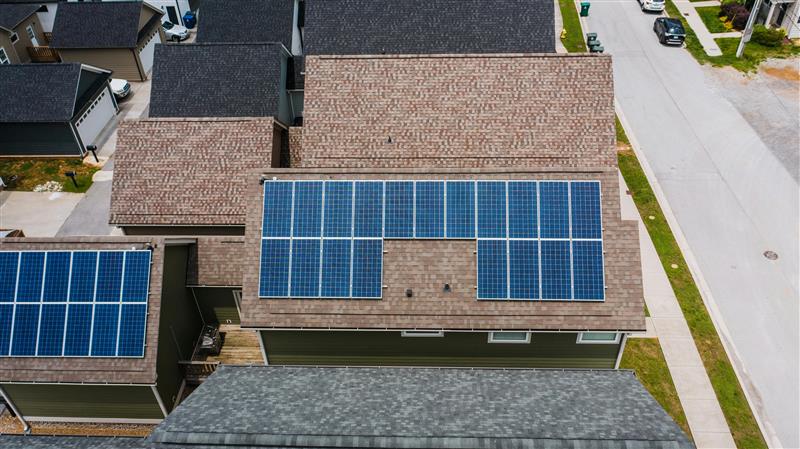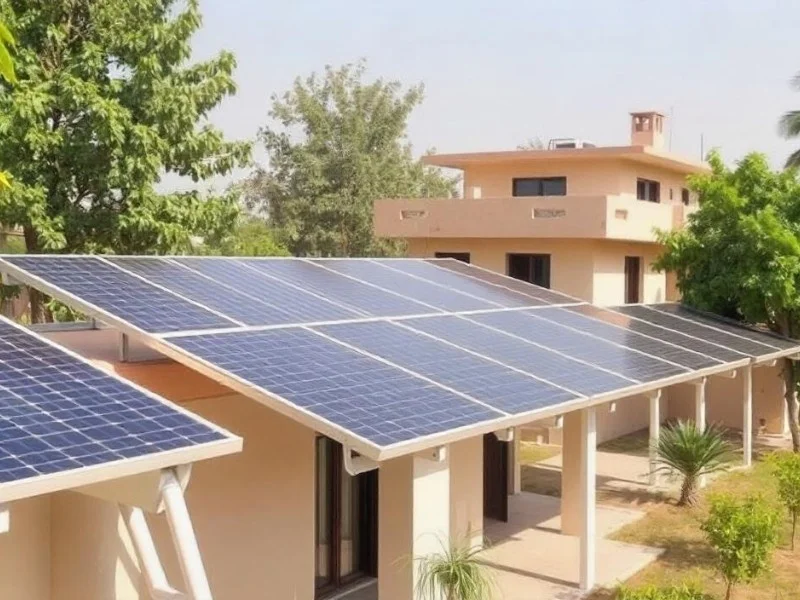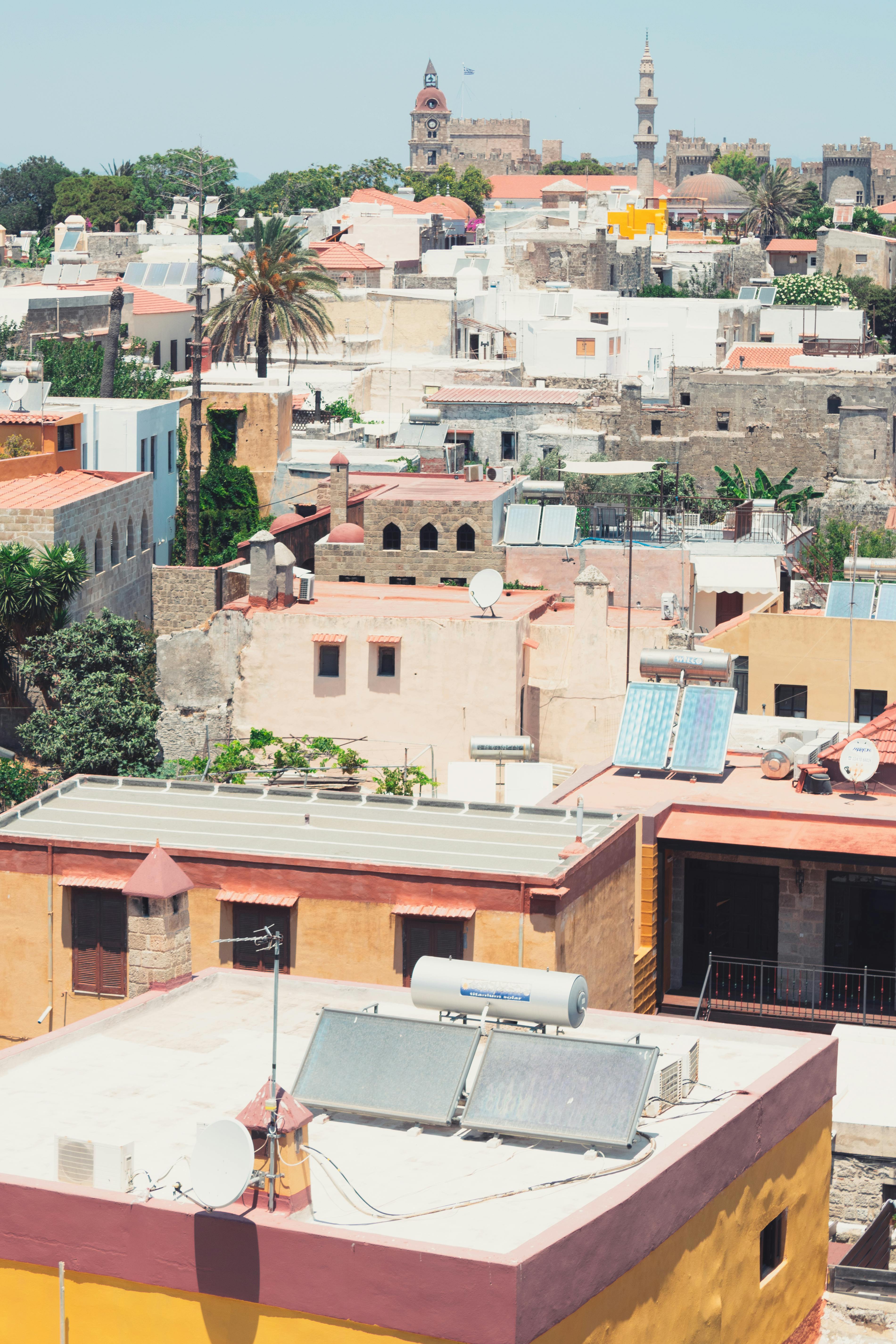A 5-kW Rooftop Solar is typically suitable for larger houses or small commercial units that have multiple air conditioners and other heavy appliances, or for small commercial spaces. To install a 5-kW rooftop solar, you will need less than 35-40 square meters (approximately 380-430 square feet) of shadow-free area.
In urban areas, a grid-connected or on-grid system is recommended, as these areas are less likely to experience power outages. Additionally, these systems are more affordable compared to Off-Grid and Hybrid system and require less maintenance throughout their lifespan.
To achieve a rooftop solar with around 5 kWp capacity, you would need about 10 solar panels, each rated at 540Wp or more. However, the system’s exact capacity may vary based on the panel rating and quantity. For example, with 10 panels of 540 Wp, the total capacity would be 5400 Wp, or 5.4 kWp, slightly exceeding 5 kW.
Also, it is important to note that this is the maximum output that the system can provide during peak hours, the output will vary as per the irradiation during the day.

So, for a 5.4 kWp system, a 5-kWinverter is recommended. If you have chosen a 5-kW system, it is much more likely that you have a 3-phase system, hence 3-phase 5-kW solar inverter is recommended.
What appliances can a 5kWp solar plant support?
Since we are suggesting an On-Grid system, all your appliances can run simultaneously without any trouble. As the name says, the On-Grid system is connected to the grid i.e. your electricity supplier, hence the system can take the entire connected load.
What are the Components required in a 5kW system?
Pricing
A 5-kW rooftop solar plant can cost you somewhere between Rs. 2,75,000/- to Rs. 3,50,000. However, it is to be noted that this is the minimum cost, and it is always possible that the installer is suggesting a better solar panel with a higher rating and there are other additional features/services added to your quotation. The prices may vary depending on the type and rating of solar panel used, solar module mounting structure used and, any other additions.
Subsidy
The PM – Surya Ghar: Muft Bijli Yojana offers subsidy to residential rooftop owners to install solar plants. Here is how the subsidy will work
- Rs. 30,000/- per kW up to 2 kW
- Rs. 18,000/- per kW for additional capacity up to 3 kW
- Total Subsidy for systems larger than 3 kW capped at Rs 78,000
Here In the case of a 5kW system, you can expect a maximum subsidy of Rs. 78,000/- from the central government.
For subsidy, the consumer will have to log on to the National portal i.e. https://pmsuryaghar.gov.in and fill in the required details and upload the necessary documents. Once the solar rooftop plant is commissioned and the DISCOM approves all the documents, the subsidy will be deposited to the consumer’s bank account which was filled during the submission of the form.
States and UTs like Delhi Gujarat Himachal Pradesh, Uttarakhand and Maharashtra also offer solar subsidy at the state level as well. For example, Residential consumers can receive INR 23,000 per kW for systems ranging from 0-1 kW and INR17,000 per kW for systems between 1-3 kW. It is advised to check the state’s DISCOM website to get the latest update and validity of the subsidy.
For commercial and industrial consumers, subsidies are not applicable. A 5kW might be too small for a commercial or industrial setup unless it is a showroom/coaching institute or as mall workshop. Having said that, in commercial cases, accelerated depreciation and GST benefits can be applied to claim tax benefits. For a solar plant operational for over 180 days in a fiscal year, it qualifies for a 40 percent depreciation in the first year, followed by an additional 20 percent. Solar operators can consequently claim up to 60 percent depreciation in the initial year.
Financing options: There are banks and financing institutions like solar loans. For example, Aerem offers collateral free loans up to 90% of project cost with attractive Interest rates and disbursement within 12 hours
Also, it is possible to take a loan even if you are opting for a subsidy. Hence, the upfront capital is not a major concern to install a solar rooftop.
How many units does a 5kW Rooftop Solar plant generate?
While generation varies as per location, tilt angle and orientation of the solar panel, etc., one can expect a 5 kWp system to generate ~570 units/month or ~6900 units/year.
How much will the electricity bill be reduced after installing the Rooftop Solar?
While the education in bill depends on your consumption, we can estimate savings based on solar generation. Considering an average tariff of Rs.10/kWh for a residential consumer, One can expect a saving of ~Rs.5700/month considering an average generation of 570 units/month.
How to maintain a 5-kW rooftop solar plant?
Solar plants generally require minimum maintenance. Ideally, the EPC company should provide 1 year of AMC with quarterly technical visits and any emergency visit in case of a breakdown. Apart from this bi-monthly or monthly cleaning of solar panels with water is recommended to clean dust, and dirt deposited on the panels.
And what about Hybrid and Off-Grid systems? Should we consider them while finalizing our solar rooftop plant? And what is the price in both cases?
We would always recommend an On-Grid system considering the affordability and the option of subsidy, especially if the solar plant is to be installed in areas with minimal or no power cuts.
Let us briefly understand both cases:
Hybrid: This is a great solution when there are frequent power cuts, this ensures a reliable supply of electricity. Subsidy can be availed in case of Hybrid systems as well, but it will be subject to approval by the respective Electricity Regulatory Commissions. A typical Hybrid 5 kW rooftop system can cost around Rs. 4,00,000-Rs. 5,00,000/- and a maximum subsidy of Rs. 78,000 can be considered for it.
Off-grid System: This system is only recommended where there is absolutely no access to electricity say in a remote hill station/town. Although with an off grids system, you won’t be able to opt for subsidy.
A 5 kW Off-grid system can cost you around Rs. 4,00,000- Rs. 5,00,000 and can vary depending on the load.
We hope this article clarifies your questions about a 5-kW system. You can write to us connect@aerem.co for any questions and queries about solar installation and solar finance needs.

.webp)
.webp)
.webp)






.jpg)
.jpg)






.jpg)





.jpeg)











.jpg)


.png)
.png)
.png)
.png)
.png)
.png)


.png)


.jpg)
